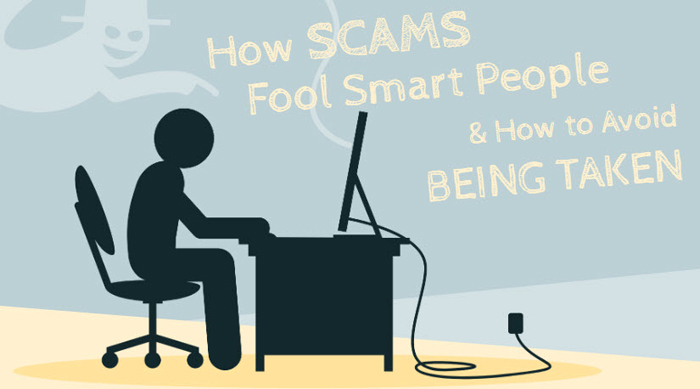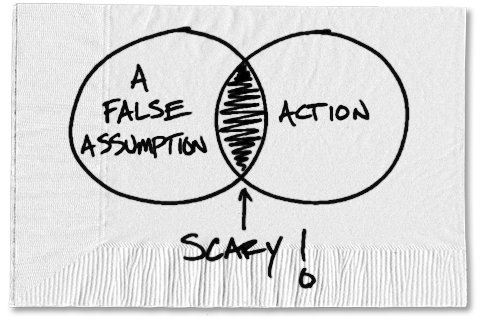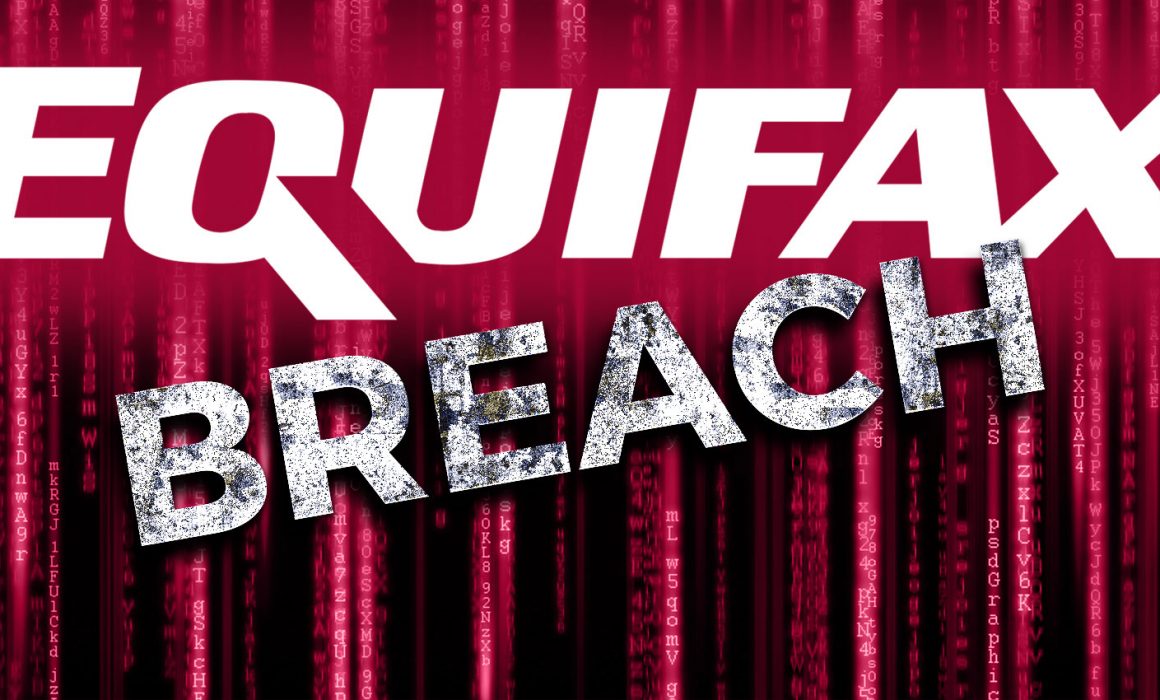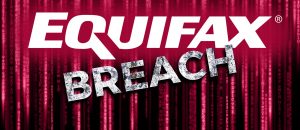How SCAMS Fool Smart People & How to Avoid BEING TAKEN
DO YOU THINK YOU’RE TOO SMART TO BE SCAMMED?
About 4 out of 5 people say yes.1 Most also believe they’re better than others at spotting scams.2 Yet, scams work—and they’re more prevalent and profitable than ever before.3 In fact, every 15 seconds, someone’s getting scammed.4
Each year, that’s billions lost. Seniors alone lose at least $2.9 billion a year to con artists.5 And they aren’t even the most vulnerable marks. Millennials are.6
So, why are financial scams more rampant and lucrative than ever before? Technology and the internet have been key. They’ve given scammers a better smokescreen and a global reach. They’ve also made it easier to perpetrate mass fraud schemes.7
Beyond having better tools, scammers also have better prey these days. The uncertainties of the day have made it easier to manipulate and con people.8 After all, we’re naturally averse to uncertainty.9 It scares us.10 It makes us desperate for stability and impulsive when a golden opportunity seems to arise.11
That’s an ideal combination for scammers. And it’s why financial fraud spiked during the pandemic, just like it did during the Great Recession of 2008.12
That paints a dark picture, but it’s not all bad news. If you know what modern cons look like, you can easily spot and avoid them.
What Multi-Billion Dollar SCAMS Look Like
1. IMPOSTER SCAMS
Imposter scams involve someone posing as a person you trust as a way to steal from you. They might pretend to be from the government or tech support, or a family member having an emergency. In 2019, they drained bank accounts of more than $667 million, with the average victim losing about $700.3
To spot an imposter scam, always be suspicious of out-of-the-blue callers or new online “friends” requesting wire transfers, payments by gift cards, or access to your computer. Ask for a number to call them back, then contact the agency directly to confirm what the caller told you.
2. IDENTITY THEFT
Identity thieves steal and use personal information for financial gain. About 1 in 3 Americans have been, or will be, the victims of identity theft. About 1 in 5 will be victimized more than once. Credit card fraud is the most common type of identity theft, followed by loan fraud and bank fraud.3 In 2019, child identity theft alone resulted in more than $540 million in losses.9
You can protect yourself against identity theft by safeguarding your personal information and records. Shred sensitive documents, regularly change your passwords, and monitor your credit report routinely. Address any suspicious charges or new accounts as soon as possible.
3. SHOPPING SCAMS
Online shopping scams offer great deals on luxury items or something for free if you pay for shipping. While some just want to steal your cash, others try to get you to click on an ad that’ll download a virus or malware to steal your information.10 In 2019, more than $136 million was lost to shopping scams.3
Avoid shopping scams by always checking out return/refund policies before making a purchase. Pay by credit card, keep receipts for online purchases, and carefully review your credit card charges each month for any suspicious activity.
4. JOB OPPORTUNITY SCAMS
These scams promise opportunities to work from home, start your own business, become a mystery shopper, and more. No matter what income opportunity is presented, they all ask for money up front.11 In 2019, these scams raked in about $85 million, with the average victim losing about $1,300.3
If you’re considering a new business opportunity, avoid a scam by doing your homework. Research opportunities before giving up cash or personal info. Check for any complaints against the company presenting the offer, and always get details up front, in writing.
5. PRIZE SCAMS
You’ve just won! But you have to pay some fee or share some personal information to collect your prize. That’s how lottery and sweepstakes scams work. They try to manipulate you once you’re excited and get you to act quickly.12 It’s how they stole more than $121 million from Americans in 2019.3
Remember, legitimate sweepstakes and lotteries never require payment for prizes you’ve already won. If you need to pay to collect a prize, it’s a scam. If someone claims to be from a legitimate company, like Publishers Clearing House, look up the company’s phone number and call for confirmation.
How to Turn the Tables on SCAMMERS & Protect Your Finances
You never know when or how you may be targeted by a scam.
Con artists can bait you at any time, and their schemes are becoming increasingly sophisticated and organized.
Some con artists are even joining respected organizations to appear more trustworthy and put a legitimate face on their schemes. Bernie Madoff is a prime example. It’s how he was able to run one of the largest Ponzi schemes in history.13
Yet, as tricky as financial fraudsters can be, they aren’t rocket scientists. Remember, no matter how fancy a con artist’s tricks or disguises may be, they ALL rely on the same tactics.
They stress urgency and exclusivity, emphasizing how special you are to have been selected for some opportunity or offer. They play on emotions, like fear and excitement, and they may even present themselves as experts. Above all, they always demand money or information up front before you get anything.14
Of course, some of these features aren’t exclusive to money scams. Some legitimate opportunities will be time-sensitive or require something up front.
With financial fraud, however, you can usually expect at least one big red flag—like wildly poor grammar, an out-of-the-blue notice of a winning or penalty, or a request to wire money via Western Union or MoneyGram.15
All that can be easy to overlook when you’re dazzled by an offer for the first time. These details are easier to see as red flags, though, when you take a second or third look.
So, always take your time when you’re considering any new financial offer or investment opportunity.
Ask questions, be skeptical, and seek out feedback from someone you trust.
And if you are victimized by a scam, report it to the Federal Trade Commission here or the Federal Bureau of Investigation here so authorities can take action.
As advisers, we’ve seen how easy it is for people to get swept up and swindled by financial scams, especially when economic turbulence hits. We’ve also helped my clients weigh their options, consider fresh angles, and make strategic decisions that better support their financial goals.
If you’re considering a new investment or you’re thinking of ways to scam-proof your finances, let’s talk. Call us at the number below. We’d love to hear about the opportunities or strategies you’re considering and share some helpful advice.
SOURCES
1 – https://www.getsafeonline.org/news/consumers-think-they-are-too-smart-to-be-scammed/
2 – https://www.nextgov.com/ideas/2020/05/people-think-theyre-too-smart-fall-phishing-scams/165197/
3 – https://www.ftc.gov/reports/consumer-sentinel-network-data-book-2019
4 – https://money.cnn.com/2016/09/20/news/financial-fraud-every-15-seconds/index.html
7 – https://www.fbi.gov/investigate/organized-crime
9 – https://www.experian.com/blogs/ask-experian/the-emotional-toll-of-child-identity-theft/
10 – https://www.consumer.ftc.gov/blog/2017/03/some-online-deals-charge-dont-deliver
11 – https://www.consumer.ftc.gov/features/feature-0019-business-opportunity-scams
12 – https://www.consumer.ftc.gov/articles/0199-prize-scams
13 – https://money.cnn.com/2008/12/29/news/newsmakers/zuckoff_madoff.fortune/
14 – https://onlinelibrary.wiley.com/doi/abs/10.1111/spc3.12115
15 – https://scambusters.org/scamlanguage.html

























